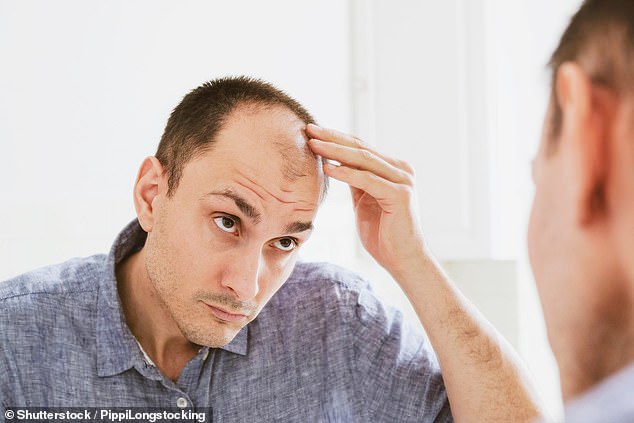Hair loss affects about 85 percent of men by the time they reach middle age, and there’s not much anyone can do to stop it.
But now, scientists have discovered an ancient biological mechanism that triggers a stress response in hair follicle cells, leading to restricted hair growth.
And as a result, they say they could be one step closer to a hair loss treatment.
The team, from the University of Manchester, unexpectedly discovered the link in a laboratory experiment in which they were testing a drug to see if it stimulated human scalp hair follicles in a dish.
The analysis revealed that when a mechanism called the Integrated Stress Response (ISR) was overactivated, it had a negative impact on hair growth.
The University of Manchester team unexpectedly discovered the link in a laboratory experiment in which they were testing a drug to see if it stimulated human scalp hair follicles in a dish.
This response is important as it allows cells to slow down their usual activities when they are stressed, becoming partially inactive to adapt and cope with the stress.
A hair follicle cell can become stressed, for example, as it ages and becomes less able to produce proteins properly.
However, if the ISR is overactivated, it can cause cell death, which stops healthy hair growth.
As a result, finding a way to stop overactivation of the ISR may lead to a treatment to prevent hair loss, the team said.
The team now seeks to better understand the influence of ISR on hair follicles and study its activity in people with hair loss conditions.
Dr Talveen Purba, lead author of the study, said: “We are incredibly hopeful because we believe that activation of this pathway could play an important biological role in restricting hair growth in people with hair loss conditions, which means that attacking it could lead to new treatments.’
Derek Pye, chief technician of the research group and co-author of the study, added: “When we look at the hair follicles under the microscope, it is surprising how consistent the response is between the hair follicles of different people.”
While they are not currently known to influence the integrated stress response, there are some that are being investigated in other contexts, Dr. Purba said.
And although some hair loss medications already exist, many people who take them experience side effects and the degree of hair growth (if any) can vary from person to person, he added.
The vast majority of men who lose hair do so due to male pattern baldness, which is an inherited condition.
In addition to medications to stimulate hair growth, some men opt for laser treatment to help invigorate circulation to the scalp and stimulate hair follicles, while others undergo hair transplant surgery.
The findings were published in the journal Plos One.


